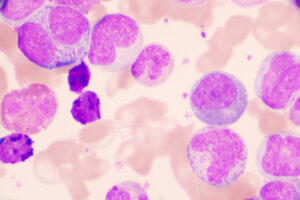Oncology
Chronic Lymphocytic Leukemia
Chronic Lymphocytic Leukemia Treatment Patterns in the Era of Novel Agents
Overview
First-line treatment for chronic lymphocytic leukemia (CLL) was the focus of several presentations at the 63rd ASH Annual Meeting and Exposition. Overall, chemotherapy-based regimens for CLL are on the decline.
Following these presentations, featured expert Jan A. Burger, MD, PhD, was interviewed by Conference Reporter Editor-in-Chief Tom Iarocci, MD, and Dr Burger’s perspectives are presented here.
Jan A. Burger, MD, PhD
|
|
"The novel agents will dominate the treatment field here in the United States and globally, at least in the health care systems that have access to and can afford the new agents. While I would like to see this evolution happen more quickly, I think that most hematologist-oncologists have been convinced and encouraged by the data for the BTK inhibitors and venetoclax."
The availability of novel agents has increased treatment options in both the front- and second-line settings CLL. These agents include Bruton tyrosine kinase (BTK) inhibitors such as ibrutinib and acalabrutinib, the BCL-2 inhibitor venetoclax, and phosphoinositide 3-kinase inhibitors such as idelalisib. Anti-CD20 monoclonal antibodies such as rituximab and, more recently, obinutuzumab are also included in many targeted regimens.
Given the improvement in outcomes with these newer agents, treatment recommendations and practice patterns have also evolved. Mato and colleagues presented an analysis of prescribing trends in community practice at ASH 2021 based on the Flatiron Health database, drawing from approximately 280 cancer clinics and approximately 800 different sites of care in the United States (abstract 4086). Overall, the results indicated that, from December 2015 to December 2020, ibrutinib was the most common first-line treatment, followed by bendamustine plus rituximab (BR) and rituximab monotherapy. Additionally, over each subsequent 2-year period, treatment patterns for the top 10 first-line treatment regimens shifted (ie, the use of novel targeted oral agents increased from 27.1% in 2015-2016 to 63.8% in 2019-2020). To me, these results suggest some differences between academic and community practice settings. Chemoimmunotherapy (CIT) is still being used in community settings to some degree today based on this analysis, while academic institutions have shifted toward primarily using targeted therapies over the years. Single-agent CD20 antibodies are not very effective for the treatment of CLL, although they can sometimes be useful in selected situations, primarily for autoimmune complications. Generally, I think that these data underscore the overall trend toward using targeted therapies, as the use of traditional chemotherapy-containing regimens is on the decline, which is a take-home message from the study by Mato et al (abstract 4086).
Clearly, this is a positive development that is supported by the survival data from a series of randomized trials comparing chemotherapy-containing regimens with the novel agents, which consistently demonstrated better survival outcomes with the newer agents. BR has been used as a comparator arm in several of the trials with BTK inhibitors or venetoclax, and the survival outcomes and the safety profiles clearly favor the newer agents. In fact, at ASH 2021, Woyach and colleagues reported updated data from the A041202 trial (abstract 639), which had previously shown that ibrutinib regimens prolong progression-free survival to a greater extent than BR in older patients with treatment-naive CLL. Now at 55 months, researchers revealed that the benefits of ibrutinib regimens over CIT were consistent for all subgroups of patients (ie, as defined by TP53 abnormalities, 11q deletion, complex karyotype, and IGHV); no additional benefits of rituximab when combined with ibrutinib were reported. Additionally, results indicated that there were greater benefits of ibrutinib regimens over CIT among patients with TP53 abnormalities compared with individuals without TP53 abnormalities (abstract 639).
Historical first-line CIT regimens for CLL, such as fludarabine, cyclophosphamide, and rituximab (FCR) and BR, are still around but, rightfully, are on the decline in CLL therapy. The novel agents will dominate the treatment field here in the United States and globally, at least in the health care systems that have access to and can afford the new agents. While I would like to see this evolution happen more quickly, I think that most hematologist-oncologists have been convinced and encouraged by the data for the BTK inhibitors and venetoclax.
References
Byrd JC, Jones JJ, Woyach JA, Johnson AJ, Flynn JM. Entering the era of targeted therapy for chronic lymphocytic leukemia: impact on the practicing clinician. J Clin Oncol. 2014;32(27):3039-3047. doi:10.1200/JCO.2014.55.8262
Kabadi SM, Near A, Wada K, Burudpakdee C. Real-world treatment patterns, adverse events, resource use, and costs among commercially insured, younger patients with chronic lymphocytic leukemia in the USA: a retrospective cohort study [published correction appears in Adv Ther. 2020;37(7):3149]. Adv Ther. 2020;37(7):3129-3148. doi:10.1007/s12325-020-01350-w
Mato AR, Ravelo A, To TM, Schuldt R, Biondo JML. Real-world treatment patterns and outcomes of patients with chronic lymphocytic leukemia (CLL) receiving first-line (1L) therapy in the United States (US) [abstract 4086]. Abstract presented at: 63rd American Society of Hematology Annual Meeting and Exposition; December 11-14, 2021.
Moia R, Patriarca A, Schipani M, Gaidano G. The biology of chronic lymphocytic leukemia: diagnostic and prognostic implications. Cancer J. 2021;27(4):266-274. doi:10.1097/PPO.0000000000000534
Woyach JA, Ruppert AS, Heerema NA, et al. Ibrutinib regimens versus chemoimmunotherapy in older patients with untreated CLL. N Engl J Med. 2018;379(26):2517-2528. doi:10.1056/NEJMoa1812836
Woyach JA, Ruppert AS, Heerema NA, et al. Long-term results of Alliance A041202 show continued advantage of ibrutinib-based regimens compared with bendamustine plus rituximab (BR) chemoimmunotherapy [abstract 639]. Abstract presented at: 63rd American Society of Hematology Annual Meeting and Exposition; December 11-14, 2021.
This information is brought to you by Engage Health Media and is not sponsored, endorsed, or accredited by the American Society of Hematology.











